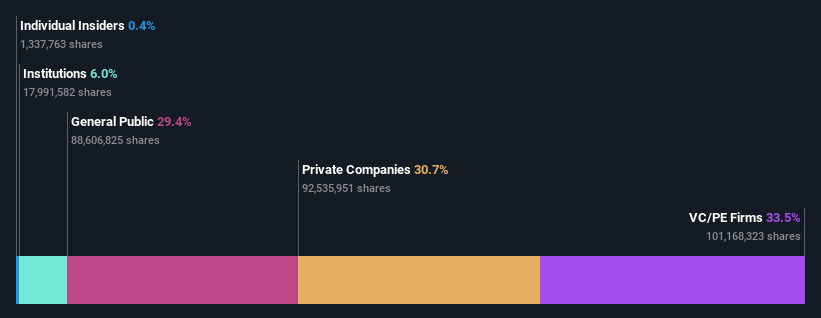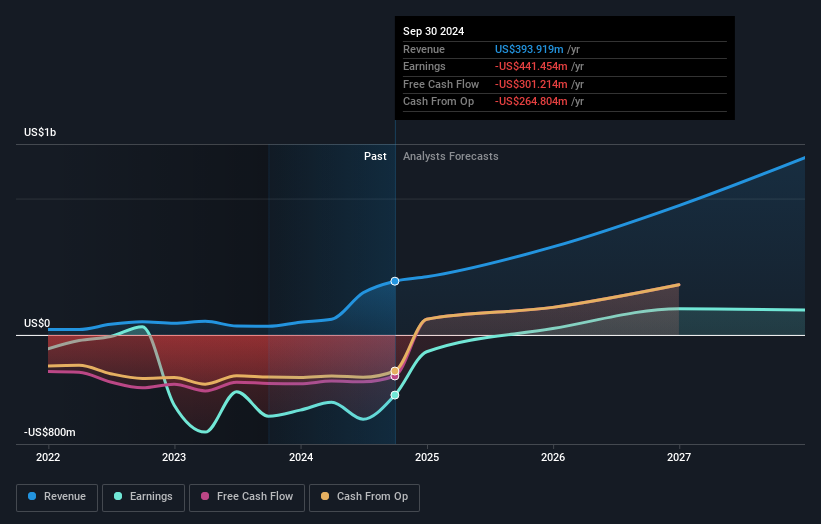Private equity firms account for 34% of Alvotech's (NASDAQ:ALVO) ownership, while private companies account for 31%
Key Insights
- Alvotech's significant private equity firms ownership suggests that the key decisions are influenced by shareholders from the larger public
- A total of 2 investors have a majority stake in the company with 63% ownership
- Using data from analyst forecasts alongside ownership research, one can better assess the future performance of a company
If you want to know who really controls Alvotech (NASDAQ:ALVO), then you'll have to look at the makeup of its share registry. With 34% stake, private equity firms possess the maximum shares in the company. In other words, the group stands to gain the most (or lose the most) from their investment into the company.
Meanwhile, private companies make up 31% of the company’s shareholders.
In the chart below, we zoom in on the different ownership groups of Alvotech.
Check out our latest analysis for Alvotech

What Does The Institutional Ownership Tell Us About Alvotech?
Many institutions measure their performance against an index that approximates the local market. So they usually pay more attention to companies that are included in major indices.
As you can see, institutional investors have a fair amount of stake in Alvotech. This suggests some credibility amongst professional investors. But we can't rely on that fact alone since institutions make bad investments sometimes, just like everyone does. When multiple institutions own a stock, there's always a risk that they are in a 'crowded trade'. When such a trade goes wrong, multiple parties may compete to sell stock fast. This risk is higher in a company without a history of growth. You can see Alvotech's historic earnings and revenue below, but keep in mind there's always more to the story.

Hedge funds don't have many shares in Alvotech. Aztiq Pharma Partners S.à R.L. is currently the largest shareholder, with 34% of shares outstanding. Celtic Holdings S.C.A. is the second largest shareholder owning 30% of common stock, and The Vanguard Group, Inc. holds about 1.1% of the company stock.
A more detailed study of the shareholder registry showed us that 2 of the top shareholders have a considerable amount of ownership in the company, via their 63% stake.
While studying institutional ownership for a company can add value to your research, it is also a good practice to research analyst recommendations to get a deeper understand of a stock's expected performance. There are plenty of analysts covering the stock, so it might be worth seeing what they are forecasting, too.
Insider Ownership Of Alvotech
While the precise definition of an insider can be subjective, almost everyone considers board members to be insiders. Company management run the business, but the CEO will answer to the board, even if he or she is a member of it.
Most consider insider ownership a positive because it can indicate the board is well aligned with other shareholders. However, on some occasions too much power is concentrated within this group.
Our most recent data indicates that insiders own less than 1% of Alvotech. However, it's possible that insiders might have an indirect interest through a more complex structure. It's a big company, so even a small proportional interest can create alignment between the board and shareholders. In this case insiders own US$18m worth of shares. Arguably, recent buying and selling is just as important to consider. You can click here to see if insiders have been buying or selling.
General Public Ownership
With a 29% ownership, the general public, mostly comprising of individual investors, have some degree of sway over Alvotech. This size of ownership, while considerable, may not be enough to change company policy if the decision is not in sync with other large shareholders.
Private Equity Ownership
Private equity firms hold a 34% stake in Alvotech. This suggests they can be influential in key policy decisions. Sometimes we see private equity stick around for the long term, but generally speaking they have a shorter investment horizon and -- as the name suggests -- don't invest in public companies much. After some time they may look to sell and redeploy capital elsewhere.
Private Company Ownership
Our data indicates that Private Companies hold 31%, of the company's shares. Private companies may be related parties. Sometimes insiders have an interest in a public company through a holding in a private company, rather than in their own capacity as an individual. While it's hard to draw any broad stroke conclusions, it is worth noting as an area for further research.
Next Steps:
It's always worth thinking about the different groups who own shares in a company. But to understand Alvotech better, we need to consider many other factors. Case in point: We've spotted 2 warning signs for Alvotech you should be aware of, and 1 of them is potentially serious.
If you are like me, you may want to think about whether this company will grow or shrink. Luckily, you can check this free report showing analyst forecasts for its future.
NB: Figures in this article are calculated using data from the last twelve months, which refer to the 12-month period ending on the last date of the month the financial statement is dated. This may not be consistent with full year annual report figures.
New: Manage All Your Stock Portfolios in One Place
We've created the ultimate portfolio companion for stock investors, and it's free.
• Connect an unlimited number of Portfolios and see your total in one currency• Be alerted to new Warning Signs or Risks via email or mobile• Track the Fair Value of your stocks
Try a Demo Portfolio for FreeHave feedback on this article? Concerned about the content? Get in touch with us directly. Alternatively, email editorial-team (at) simplywallst.com.This article by Simply Wall St is general in nature. We provide commentary based on historical data and analyst forecasts only using an unbiased methodology and our articles are not intended to be financial advice. It does not constitute a recommendation to buy or sell any stock, and does not take account of your objectives, or your financial situation. We aim to bring you long-term focused analysis driven by fundamental data. Note that our analysis may not factor in the latest price-sensitive company announcements or qualitative material. Simply Wall St has no position in any stocks mentioned.
Disclaimer: Investing carries risk. This is not financial advice. The above content should not be regarded as an offer, recommendation, or solicitation on acquiring or disposing of any financial products, any associated discussions, comments, or posts by author or other users should not be considered as such either. It is solely for general information purpose only, which does not consider your own investment objectives, financial situations or needs. TTM assumes no responsibility or warranty for the accuracy and completeness of the information, investors should do their own research and may seek professional advice before investing.
Most Discussed
- 1
- 2
- 3
- 4
- 5
- 6
- 7
- 8
- 9
- 10